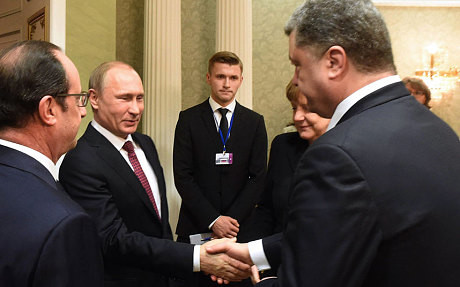Ukraine crisis: Shelling follows Minsk peace summit
Published on 13 february 2015There are no confirmed reports of casualties. Both cities are near the front line where the pro-Russian rebels face government forces.
The ceasefire agreed in the Belarusian capital is to begin in eastern Ukraine after midnight (22:00 GMT) on Saturday.
The EU has warned Russia of additional sanctions if the deal is not respected.
BBC journalists in Donetsk heard new shelling on Friday morning, though they said it sounded less intense than in recent days.
Luhansk also came under bombardment overnight.
Doubts remain about the peace deal, which was agreed following marathon negotiations between Russia, Ukraine, Germany and France.
Pro-Russian rebels have signed the agreement, which also includes weapon withdrawals and prisoner exchanges, but key issues remain to be settled.
A new round of EU asset freezes and travel bans against 19 Ukrainian separatists and Russians - in response to deadly fighting in the city of Mariupol in January - will come into effect on Monday regardless of the latest deal.
But German Chancellor Angela Merkel says wider measures could be implemented if the ceasefire is not upheld.
She has described the deal as "a glimmer of hope, no more no less. It is very important that words are followed by actions.
"Ukrainian President Petro Poroshenko says Ukrainian and Russian military commanders will hold direct talks - including on the withdrawal of heavy armour to create a buffer zone.
He warned that implementation of the agreement, reached by leaders in the Belarusian capital Minsk, would be difficult.
Another sticking point is the disputed town of Debaltseve, a strategically key government-held town which rebels claim to have surrounded but which Ukraine refuses to surrender.
Further talks will also be held on self-rule in parts of Donetsk and Luhansk separatist regions.
Few in Donetsk expect a sudden and complete end to war, says the BBC's James Reynolds who is there.
Ukraine and the West accuse Russia of supplying weapons and personnel to the rebels but Russia denies this.
More than 5,400 people have been killed since the conflict began. There has been a dramatic rise in casualties in recent days, with 263 civilians killed in populated areas between 31 January and 5 February.
Source: BBCnews
Photo sources: Telegraph, Reutersmedia


